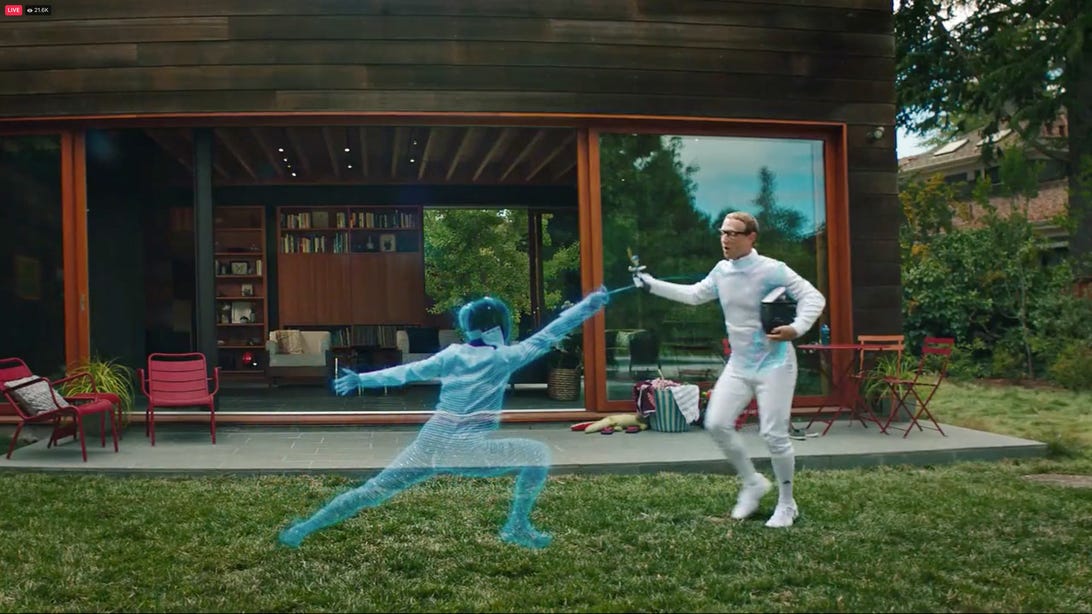Social VR startup Rec Room wants to take on Meta’s Horizon Worlds, and raised $145 million to do it

[ad_1]
One of the biggest apps in virtual reality just got a boost in its bid to become one of the biggest players in the next big tech trend, the metaverse.
Rec Room, a Seattle-based social gaming startup founded by people who worked on Microsoft’s early HoloLens efforts, said Monday it has raised $145 million. That puts its valuation at $3.5 billion, more than the nearly $3 billion Facebook agreed to pay when it acquired VR startup Oculus in 2014. Rec Room’s new funding, which was led by Coatue Management and involved existing investors Sequoia Capital, Index Ventures and Madrona Venture Group, will be used to grow the company and hire more employees.
CEO Nick Fajt, who co-founded Rec Room in 2016, said the company has seen a jump in users amid the pandemic as people logged on to play games such as pinball and laser tag and race in vehicle rallies while chatting with other players. Though the company declined to say how many people logged into its platform each month, it did say they’d jumped more than 450% in November from the same time last year.
Fajt said some of that growth had come from the company’s apps being added to iPhones in 2019 and Android phones this summer. He also noted that users had created more than 12 million rooms in which to play games or chat. “It comes down to providing a really strong community,” Fajt said.
But in its push to grow, the company will face competition. It’s the latest in a string of social-focused apps to find success amid the COVID-19’s perpetual isolation. Other apps like the world-building games Minecraft and Roblox, as well as the online battle game Fortnite, became havens for people to meet up amid the pandemic. Gaming network traffic jumped early in the pandemic and kept rising too.
Rec Room offers a virtual world where people can play games, like racing, while also hanging out online.
Rec Room
People are also spending significant time in those games. When Roblox went public last year, the company said an average of 31.1 million people logged onto its service per day, up more than 80% from the same time in 2019. This November, a year later, Roblox said that number had jumped again to 47.3 million.
Read more: As Facebook plans the metaverse, it struggles to combat harassment in VR
This boom of digital worlds where people can interact has led much of the tech industry to describe them with a new catchphrase, the metaverse. Fortnite maker Epic Games has discussed the concept when describing how its hit fighting game has also served up live music concerts, celebrity meetup events and even movie nights. Other companies have latched onto this idea, as well, with executives at companies from Microsoft to dating app Match to cryptocurrency specialist Coinbase and even the entertainment giant Disney talking about how they’re building their own metaverses.
Facebook co-founder Mark Zuckerberg was so excited about the metaverse that he changed his company’s name in October — to Meta. “In our DNA, we are a company that builds technology to connect people and the metaverse is the next frontier, just like social networking was when we got started,” he said at the time.

Mark Zuckerberg believes AR and VR will be the next big leap in computing.
Screenshot/Meta
When Meta launched its Rift VR headsets in 2016, virtual reality was at the peak of its hype. Investors were pouring money into VR startups, while large companies like Sony, Google, phone maker HTC and Microsoft discussed their visions for VR too. But sales didn’t boom like they had for smartphones after Apple’s iPhone launched, and so people’s enthusiasm for VR to become the next big thing waned.
That’s all started to change, as we’ve been forced to rely on technology amid the pandemic. Joost van Dreunen, a professor at NYU Stern School of Business and author of the book One Up: Creativity, Competition, and the Global Business of Video Games, said he’s become less skeptical about social worlds as he saw the world adapt to social distancing and isolation by holding funerals on Zoom and children’s birthday parties in Roblox.
“It can be a purely social thing where my kid logs in on a rainy day and plays with his friends,” he said.
Creating the metaverse
For Rec Room, the sudden excitement around the tech world represents both a huge opportunity, and a warning that it’ll face challenges from some of the industry’s biggest names. Already, Meta has been working on a free experience called Horizon Worlds that, like Rec Room, offers people a way to hang out and play games in a shared virtual environment.
Fajt said one thing that will make his company stand out is that it isn’t tied to Meta’s platform, like Horizon is. Instead, it’s available for free on Android, iPhones, PC, Sony’s PlayStation and Microsoft’s Xbox consoles, in addition to VR. It doesn’t rely on advertising for revenue either, making money instead by selling virtual goods like new looks for characters.
So far, it appears to be working. Console and VR users are averaging more than two hours in Rec Room, and mobile device users are averaging an hour. That’s similar to data Roblox revealed last year, saying its users average 2.6 hours in its game.
“If you’re going into Rec Room, you’re staying there for a while,” Fajt said.
Rec Room also hopes to stand out through its community. The company set strict guidelines about abuse and bad behavior, providing tutorials on how to use its tools to mute or even vote to kick out those causing trouble. Rec Room has also started testing automatic voice moderation, currently using a mix of community reporting, human moderators and automated tools to identify offenders.
“A big part of it is being proactive,” Fajt said, adding that the company moderates more heavily when a person first joins the platform in an effort to set the tone. He also doesn’t want to repeat mistakes that have led to mass harassment campaigns, disinformation and other dangerous behavior that Meta,Twitter, YouTube and other social media companies now struggle with.
“We didn’t say Rec Room is an open community to do whatever you want,” he added. “We have a code of conduct and expectations for content that we will and will not allow.”
Hopefully, Fajt says, those efforts will help create experiences that people will want to keep coming back to. “It’s one of the most important challenges. When we look at the next step for us, it’s going to be so much more than a game.”
[ad_2]
Source link




